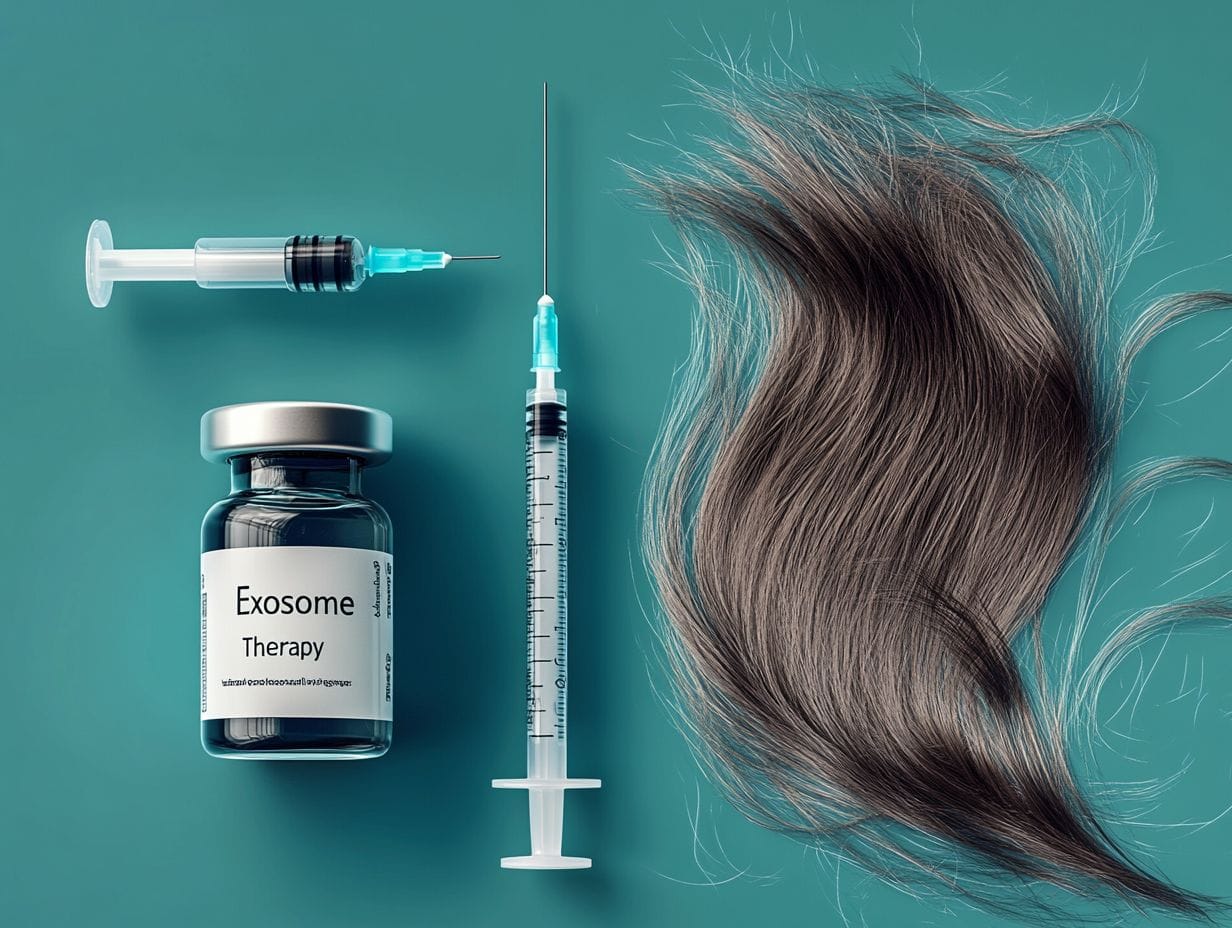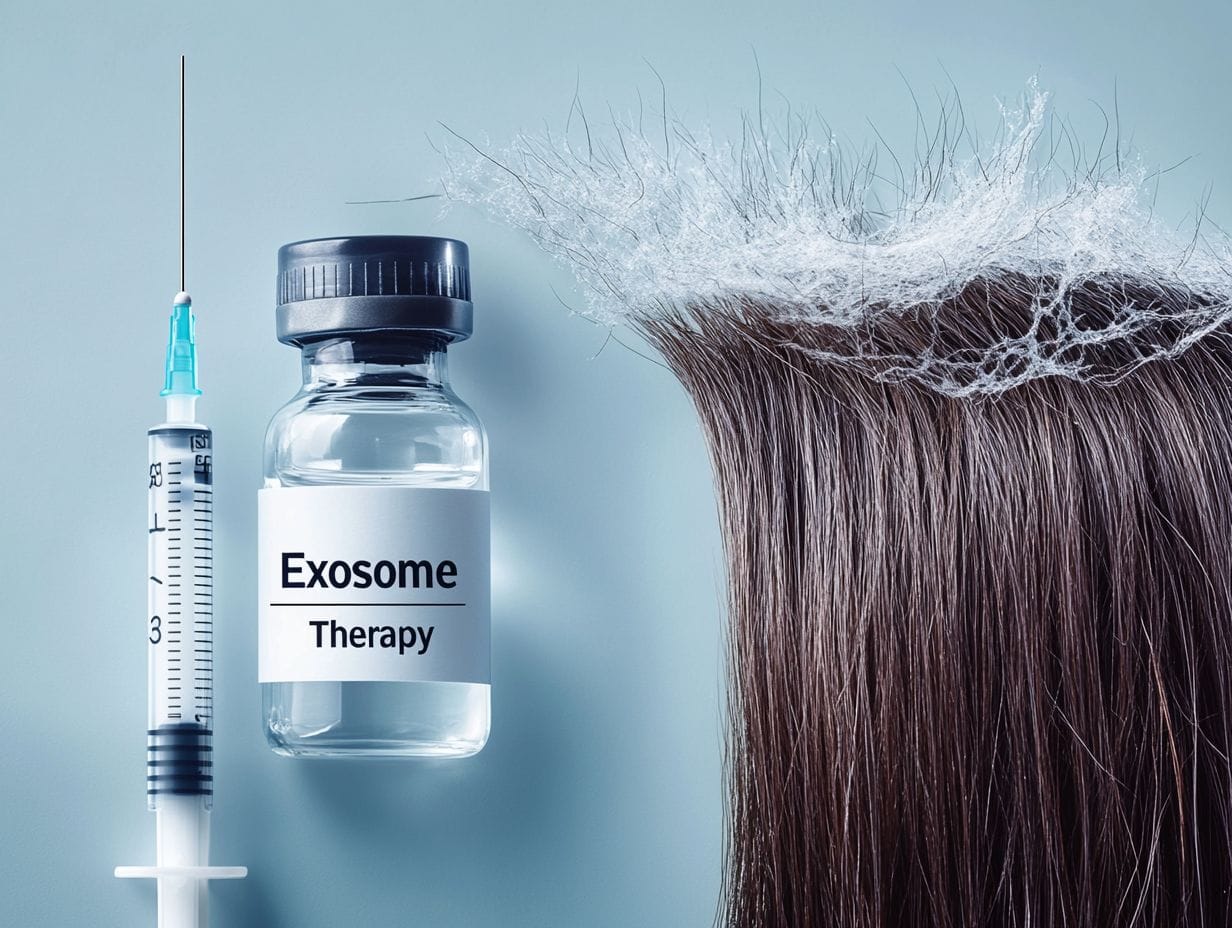Hair loss can be a distressing experience for many, prompting a search for effective solutions. This article explores the various causes and types of hair loss to help you understand the condition better.
We will then discuss two popular treatments:
- Exosome therapy
- Hair thickeners
By examining how they work, their potential benefits, and a cost comparison, we aim to guide you in choosing the right treatment for your needs.
Whether you're seeking to restore your hair or enhance its appearance, this overview has you covered.
Understanding Hair Loss

Understanding hair loss is essential for individuals affected by this prevalent condition, as it can have a profound impact on self-esteem and psychological well-being.
Numerous factors contribute to the various types of hair loss, including hormonal changes, genetic predispositions, and environmental influences, leading to conditions such as alopecia and hair thinning.
This complex issue encompasses intricate biological processes that can yield distressing outcomes for those affected, highlighting the necessity for effective treatment options and supportive therapies.
Causes and Types of Hair Loss
The causes and types of hair loss are varied, encompassing genetic predispositions such as male pattern baldness and female hair loss, as well as hormonal factors and nutritional deficiencies. Understanding these underlying causes is essential for developing effective treatment options that address both the symptoms and root issues associated with hair loss.
In men, male pattern baldness, also referred to as androgenetic alopecia, generally manifests as a receding hairline or thinning at the crown, primarily influenced by genetic and hormonal factors. In women, hair loss often presents as overall thinning rather than distinct bald patches, frequently associated with hormonal changes during pregnancy or the menopause. For those seeking solutions, comparing exosome therapy vs. scalp micropigmentation can help determine which provides better results for women’s hair loss.
Additionally, poor nutrition can significantly affect hair health; deficiencies in essential vitamins and minerals such as biotin, iron, and zinc can contribute to hair thinning and loss. By examining these various factors, one can gain a more comprehensive understanding of the complex nature of hair loss, including treatment options like exosome therapy vs. stem cell therapy.
Exosome Therapy for Hair Loss
Exosome therapy for hair loss constitutes a pioneering method within regenerative medicine, utilising the therapeutic potential of growth factors and cellular communication to facilitate hair restoration.
As clinical trials continue to demonstrate its efficacy, this innovative treatment option provides renewed hope for individuals experiencing hair loss by addressing the biological mechanisms that underpin hair follicle regeneration. In particular, understanding the differences in PRP vs. exosome therapy can help individuals make informed decisions about their hair restoration options.
How it Works and Potential Benefits
Exosome therapy functions by utilising nano-sized vesicles that transport growth factors and proteins, thereby facilitating hair follicle regeneration and promoting overall scalp health. This advanced treatment modality is gaining recognition not only for its innovative approach but also for its favourable patient outcomes and high efficacy rates demonstrated in clinical studies.
These vesicles play a pivotal role in enhancing cellular communication and stimulating the natural repair processes within the scalp. As they release bioactive molecules, patients frequently report increased hair density and improved thickness, making it a viable alternative to traditional treatments. For insights on exosome therapy vs. PRP, which may provide faster results for female hair restoration, explore further.
For example, individuals experiencing conditions such as androgenetic alopecia have reported significant hair regrowth following exosome therapy. The minimally invasive nature of this treatment is particularly appealing, as it provides a convenient option with fewer side effects compared to more invasive surgical interventions. To explore options further, consider the comparison of exosome therapy vs. micropigmentation for hair density.
By leveraging the body's inherent regenerative capabilities, exosome therapy offers hope and promising results for individuals seeking effective solutions for hair restoration.
Hair Thickeners for Hair Loss

Hair thickeners present a viable solution for individuals experiencing hair loss, offering immediate visual enhancement to hair density through various cosmetic procedures and topical applications. A diverse range of products is available, including those infused with botanical ingredients, allowing users to achieve noticeable improvements in their hair appearance.
Additionally, these individuals can explore treatment options aimed at promoting long-term hair health, such as exosome therapy vs. synthetic hair implants.
Types of Thickeners and How They Work
There are several types of hair thickeners available on the market, each utilising different mechanisms to enhance hair volume and density. These solutions range from topical hair products enriched with keratin and biotin to innovative application methods, catering to diverse patient needs and preferences, and thus presenting an appealing option for individuals experiencing hair loss.
Certain thickeners incorporate natural ingredients such as collagen and plant extracts, which not only enhance the appearance of fullness but also promote overall hair health. For those exploring different treatment options, a detailed comparison of laser therapy vs. exosome therapy can provide valuable insights. Sprays and powders offer a user-friendly solution for achieving instant volume, while serums and conditioners are designed to nourish and strengthen hair over time.
Users may experience varying degrees of effectiveness based on their hair type and the particular formulation, emphasising the importance of personalised selection in navigating the expanding array of hair enhancement options.
Comparing Exosome Therapy and Hair Thickeners
A comparison of exosome therapy and hair thickeners highlights significant differences in efficacy, treatment options, and long-term outcomes, emphasising the importance of understanding individual needs in the pursuit of addressing hair loss.
Exosome therapy for hair loss presents a regenerative approach that targets the biological factors contributing to hair loss, whereas hair thickeners offer immediate cosmetic solutions aimed at enhancing volume and density. For a deeper understanding of the differences, check out our article on hair transplant surgery vs. exosome therapy.
Efficacy and Cost Comparison
The efficacy of exosome therapy is often contrasted with the comparatively lower cost of hair thickeners, making it essential for patients to evaluate their individual circumstances when considering these treatment options. Patient testimonials and market trends indicate that, although exosome therapy may entail a higher initial cost, its long-term benefits may surpass the immediate financial considerations associated with hair thickeners.
Many patients report a significant level of satisfaction with exosome therapy, noting not only improvements in hair density but also an enhancement in their overall confidence. For a detailed comparison, you can explore laser therapy vs. exosome therapy to see which treatment is more effective for female hair loss.
It is important to recognise that as the demand for effective solutions to hair loss continues to rise, the market is experiencing a shift in which innovative treatments like exosome therapy vs. microneedling are gradually becoming more mainstream. Consequently, this increase in demand could potentially lead to a decrease in costs associated with exosome therapy over time.
In contrast, while hair thickeners may be more affordable, they often deliver only temporary results, prompting individuals to reconsider their long-term investment in both hair health and aesthetics. For those exploring more lasting solutions, exosome therapy vs. microneedling offers insights into effective treatments for women s hair loss.
Choosing the Right Treatment

Selecting the appropriate treatment for hair loss necessitates a thorough assessment of individual needs, preferences, and medical history, thereby underscoring the importance of the consultation process with a healthcare professional.
Tailored therapeutic options, which may encompass Minoxidil vs. exosome therapy for hair loss, hair thickeners, or lifestyle modifications, can significantly impact the effectiveness of treatment and overall satisfaction in managing hair loss.
[second_cta_shortcode]Factors to Consider and Consultation Process
Several critical factors must be considered during the consultation process for selecting hair loss treatments. These factors include the patient s medical history, the severity of hair loss, and individual preferences. Effective patient education, along with a clear dialogue regarding preventive measures and treatment protocols, give the power tos individuals to make informed decisions about their hair restoration journey.
During the consultation, it is imperative to address the specific concerns of the individual while also reviewing the various treatment options available. This discussion should encompass the efficacy of different treatments, including exosome therapy vs. hormone therapy, potential side effects, and the influence of lifestyle choices on overall hair health.
Moreover, emphasizing the importance of setting realistic expectations can help alleviate feelings of disappointment. By actively engaging in this dialogue, patients can gain a comprehensive understanding of the rationale behind the recommended protocols, especially when considering options like exosome therapy vs. scalp stimulation devices, ensuring they feel supported and understood throughout their treatment pathway.
Frequently Asked Questions
What is exosome therapy?
Exosome therapy for hair loss is a form of regenerative medicine that uses stem cells to promote healing and regeneration in damaged tissues or organs, including the scalp and hair follicles.
How do exosomes work to treat hair loss?

Exosomes contain growth factors and other signalling molecules that stimulate cell growth and regeneration. When injected into the scalp, exosomes can help increase hair thickness and density by promoting the growth of new hair follicles.
What are hair thickeners?
Hair thickeners are cosmetic products that are designed to make hair appear thicker and fuller. They typically work by coating the hair shaft to add volume and create the illusion of thicker hair.
Do hair thickeners treat the underlying cause of hair loss?
No, hair thickeners only provide temporary coverage for hair loss. They do not address the underlying causes of hair loss and do not promote hair growth.
Which option provides longer-lasting results?
Exosome therapy provides longer-lasting results compared to hair thickeners. This is because exosomes work to stimulate hair growth and improve the overall health of hair follicles, while hair thickeners only provide temporary cosmetic coverage.
Is exosome therapy safe?
Exosome therapy is generally considered safe, as it uses natural substances found in the body. However, as with any medical procedure, there is always a risk of side effects or complications. It is important to consult with a qualified medical professional before undergoing exosome therapy for hair loss.


